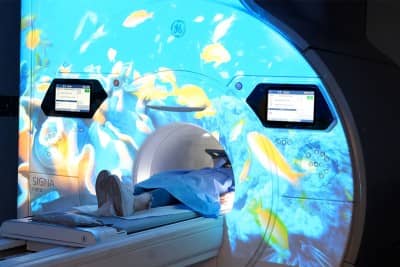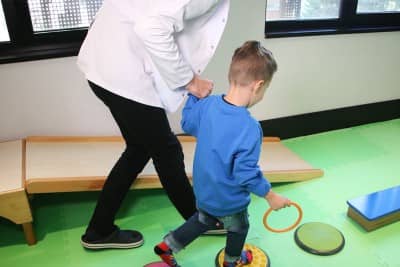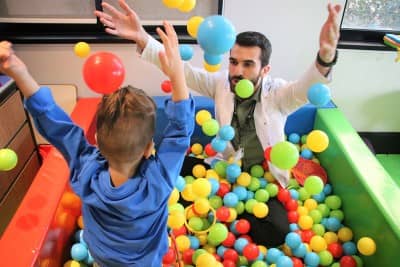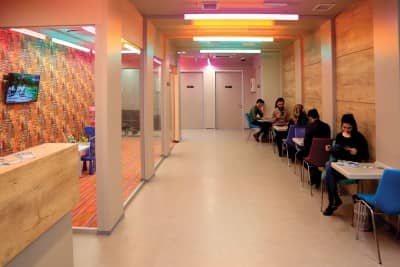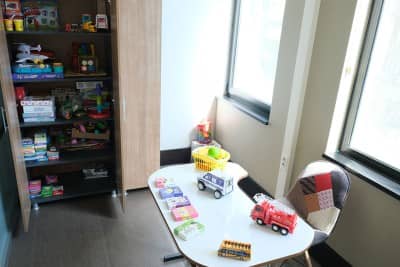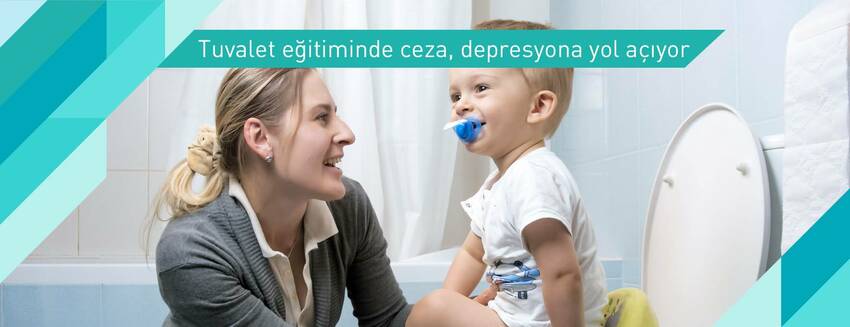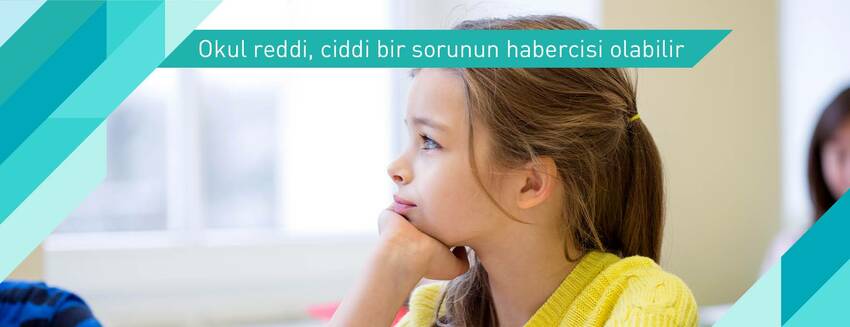
In order to be a healthy individual, psychological problems in childhood and adolescence should be prevented before they occur, and if there is a psychiatric illness, it should be solved with the right treatment method. Child-adolescent psychiatry plays an important role in ensuring that a person lives a healthy life, is self-confident and that psychiatric illnesses can be treated at an early stage when they reach maturity. Compared to past periods, child and adolescent psychiatry is expanding widely in our country and in the world. It has a very comprehensive field. It is directly linked to all biological, sociological and psychological sciences.
What is Child Psychiatry?
A child psychiatrist is a person who has completed their medical education and specializes in child-adolescent mental health. A child psychiatry doctor is the person who should be consulted when faced with a problem related to the child's mental health. All mental, cognitive, academic and social problems that may occur during the child's developmental period fall within the field of child psychiatry.
It is a person who specializes in child-adolescent mental health upon medical education. A child psychiatrist is the first person to be consulted about a child's mental health. All the difficulties of the child in mental, cognitive, academic and social areas are within the scope of child psychiatry. Child psychiatry working methods are as follows;
- Provides counseling to the family even if the child does not have any mental distress.
- It takes approaches to protect the child from situations that may affect the child without a mental disorder.
- Diagnoses mental disorders in the child. Requests the necessary tests for diagnosis.
- Predicts how the mental disorder can be treated and evaluates treatment options.
- Can organize psychotherapy and medical treatment.
- Directs the team in cases where the treatment of the child requires teamwork.
- If necessary, hospitalizes the child and follows up the child.
When should a child psychiatrist be consulted?
Child psychiatry can be consulted at any time. Even if the child does not have any mental symptoms, he/she can come for consultation or should come in case of any mental symptoms. The idea that child psychiatrists give medication and psychologists only talk is completely unfounded and very wrong. A child psychiatrist is not a pedagogue or a psychologist.
For example; How should sleep and eating habits be during infancy? The application can be made with an emotional or behavioral symptom that may negatively affect the child's daily life, school success, family relationships, and harmony with friends.
Which diseases does child psychiatry deal with?
In human life, the stage where the most development and change takes place is the 0-18 age range covering childhood and adolescence. During these periods, the subconscious is more affected by the family and the environment and records everything. Everything experienced during this period has permanent effects that direct the whole life. In order to get rid of these negative effects, families need to observe their children in time and provide the necessary support. To find a solution to this negative change, it may be necessary to consult a child psychiatry department. We can list the diseases that child psychiatry deals with as follows;
- Attention deficit and hyperactivity disorder
- Autism
- Excessive use of the Internet and computer technologies
- Depression
- Suicidal thoughts, self-harm (scratching with a razor blade, etc.)
- Anxiety disorders (separation anxiety, social phobia, etc.)
- Trauma
- Behavioral Disorders (disobedience, defiance, lying, taking things without permission, etc.)
- Learning disorders (Dyslexia etc.)
- Obsessive-compulsive disorder (obsessions)
- Tic disorder
- School refusal
- Test anxiety
- Personality issues
- Sleep problems
- Toilet habits (bedwetting, non-organic constipation, etc.)
- Eating problems (not eating, refusal to eat, etc.)
- Speech disorders (stuttering, late speech, etc.)
- Friend incompatibility
- Sexual development and sexuality-related problems
- Dissociative disorder
- Mental retardation
- Psychosis (schizophrenia etc.) and bipolar disorder
- Psychosomatic complaints such as headache and abdominal pain that cannot be explained by organic causes
In the department of child and adolescent psychiatry, treatment services are provided to children and adolescents aged 0-18 by applying treatment methods such as individual psychotherapy (psychoanalytic, supportive, cognitive behavioral therapies, EMDR (Eye Movement Desensitization and Reprocessing), family therapy, medication and psychometric tests. In some cases, people with expertise in the field of child and adolescent psychiatry also receive additional help from psychologists who are experts in the application of different finding evaluations and treatment processes. A number of developmental, attention and intelligence tests are administered by psychologists to help diagnose psychiatric disorders of childhood and adolescence.
Psychological tests that should be applied by specialists in the department of child and adolescent psychiatry are compared with clinical findings. As a result, possible psychological problems are named and an appropriate treatment plan is created and the first step is taken to prevent psychological problems in a timely manner.
Child Adolescent Psychiatry Diagnostic Methods
The diagnostic methods used in Child and Adolescent Psychiatry are designed to assess and accurately diagnose various psychiatric disorders. Some of the common diagnostic methods in this field are as follows:
Clinical Assessment: Clinical interviews conducted by a specialist psychiatrist assess the child or adolescent's general condition, emotional state, behavior and social relationships.
Observation: Observation of the child or young person in their daily life provides information about specific behavior patterns, emotional reactions and social interactions.
Family Interviews: Interviews with family members are used to obtain information about family dynamics, relationships and family history.
Psychosocial Assessment: A method used to assess the overall social and emotional status of the child or young person.
Emotional and Behavioral Testing: Specific tests are used to provide objective data about the child or young person's emotional state, intelligence level, attention span and behavior. For example, Beck Depression Scale, Child Behavior Rating Scale.
Academic Assessment: Teacher and school reports on school performance, learning difficulties and attention deficits are analyzed.
Neurological Tests: Neurological tests such as QEEG can be used to evaluate brain function.
These methods are used to understand various psychiatric problems seen in children and adolescents and to create appropriate treatment plans.
Advanced Diagnostic Methods in Child Adolescent Psychiatry
Advanced diagnostic methods in child and adolescent psychiatry aim to obtain more detailed and specific information. Some of these methods are as follows:
QEEG: It is a technique that analyzes the brain electrical activity record taken from the scalp and shows the distribution of waves of different frequencies on the brain. By measuring brain functions, it helps to identify irregularities in areas such as personality, attention and memory.
CAS (Cognitive Assessment System): It is an intelligence and ability battery that evaluates the competence of children between the ages of 5-17 in cognitive processes. It evaluates planning, attention, simultaneity and successive cognitive processes.
MOXO Continuous Performance Test: It is an attention measurement test developed for children and adults that helps diagnose ADHD. It includes measures of attention, timing, hyperactivity and impulsivity.
T.O.V.A (Test of Variables of Attention): A computerized, continuous performance test that measures attention and impulsivity. It is not affected by language and can be applied to patients of all ages with attention deficit and impulse control disorders.
COGBAT (Cognitive Basic Assessment): Part of the Vienna Test System, this test battery is used to determine the cognitive status of individuals with neurological and mental disorders. It evaluates cognitive dimensions such as memory, attention and planning.
Advanced Blood Tests: Apart from routine blood tests, advanced tests such as neuroinflammatory panel, neuroimmune panel, pharmacogenetic examination can be used.
Child Adolescent Psychiatry Treatment Methods
Various treatment methods are used to manage and treat various psychiatric problems in children and adolescents. Some of the methods used within the scope of treatment are as follows:
Cognitive Behavioral Therapy (CBT): It is a form of therapy that teaches children and adolescents to change negative thought and behavior patterns. It is especially effective against depression, anxiety and behavioral disorders.
EMDR Therapy: A special type of therapy that supports emotional healing by focusing on traumatic experiences.
Magnetic Stimulation Therapy (tTMU): A treatment method used to regulate brain activity in mental disorders such as depression.
Electro Convulsive Therapy (ECT): A method used to treat severe depression and in some cases bipolar disorder.
Direct Current Stimulation (tDCS): A safe treatment method used to increase or regulate brain activity.
Psychotherapy Applications: Includes various types of therapy that promote emotional and mental health through talking therapies.
Occupational Therapy: A therapy method that aims to improve daily living skills.
Sensory Integration: A therapeutic approach to help individuals with sensory processing and perception problems overcome these difficulties.
School Readiness Studies: Specific activities that support children's readiness for the pre-school period.
Mental Rehabilitation: Individual and group-based rehabilitation programs aimed at improving mental health.
Social Service Activities: Services that aim to increase social interaction between families and children.
Positive Psychology Practices: An approach that supports positive emotional state by emphasizing the strengths of individuals.
Neurobiofeedback (Neurotherapy) Method: It is a type of treatment that tries to regulate brain activity by receiving feedback.
Virtual Reality: A treatment method that aims to create a therapeutic effect through scenarios created in a virtual environment.
Personalized Treatment (Clinical Pharmacogenetics): An approach that predicts drug treatment response based on genetic factors.
Deep TMU (Deep TMS): It is a treatment method using deep magnetic stimulation and can be effective in the treatment of depression. However, there are case reports in Obsessive Compulsive Disorder (OCD) and research is ongoing.

